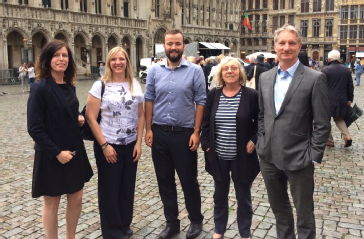IER News & blogs
IER and the new Productivity Institute
 IER is part of the Warwick partner of the newly announced ESRC-funded Productivity Institute.
IER is part of the Warwick partner of the newly announced ESRC-funded Productivity Institute.
The Institute’s goal is to make long-term policy recommendations to improve the UK’s productivity. One key task is to help solve the UK’s longstanding ‘productivity puzzle’. Another is to improve productivity and living standards as the economy recovers from COVID-19.
Warwick’s involvement is led by Professor Nigel Driffield of Warwick Business School (WBS). Warwick is one of eight partner institutions involved in the research project. Its Managing Director is Professor Bart van Ark of the University of Manchester.
In launching the Institute, UK Government Minister for Science Amanda Solloway said: ‘Improving productivity is central to driving forward our long-term economic recovery and ensuring that we level up wages and living standards across every part of the UK,’ continuing that the new funding ‘will bring together the very best of our researchers, boosting our understanding of the different drivers of productivity’.
The other partner institutions are the University of Cambridge, the National Institute of Economic and Social Research, University of Glasgow, University of Sheffield, King's College London, Queen's University Belfast and Cardiff University.
First details of the Productivity Institute can be found here.
Exploring collaborative research on graduates’ transitions into the labour market
 In July 2018, Dr Giulio Pedrini and Dr Luca Cattani from the University of Bologna will visit the IER for a month, working with Dr Daria Luchinskaya (IER) and Dr Charoula Tzanakou (PAIS) to develop a collaborative programme of research on graduate employment between the University of Warwick and the University of Bologna.
In July 2018, Dr Giulio Pedrini and Dr Luca Cattani from the University of Bologna will visit the IER for a month, working with Dr Daria Luchinskaya (IER) and Dr Charoula Tzanakou (PAIS) to develop a collaborative programme of research on graduate employment between the University of Warwick and the University of Bologna.
During their visit, funded by the Institute of Advanced Studies International Fellowships award, the researchers will investigate graduates’ transitions into the labour market in Italy and the UK, comparing the two labour market regimes and the roles of training and internships in enabling career progression. As part of the visit, a number of workshops and events will be organised, including an IER lunchtime workshop.
Drs Pedrini and Cattani have both visited the IER previously. Dr Cattani visited in 2012-13, where he developed a classification of graduate jobs for Italy for a part of his PhD, “Overeducation of Italian graduates.” Dr Pedrini visited the IER in 2015, working on his project “Non-standard employment as a determinant of off-the job and on-the-job training” with Prof. Kate Purcell, and contributing to the IER project “Precarious pathways to employment for young people” (“Paths2Work”). This visit will further the collaboration on graduate employment research between the IER and the University of Bologna. Both IER and the University of Bologna have longitudinal surveys of graduates’ higher education experience and employment, Futuretrack and AlmaLaurea respectively. The visit is timely, as Prof. Chris Warhurst and Dr Luchinskaya are leading the fifth stage of the Futuretrack project, and Dr Tzanakou is publishing on graduate transitions in the UK labour market with Prof. Purcell from the “Paths2Work” project.
IER delegation visits the VUB in Brussels

In May, a delegation of senior staff from IER visited the Interface Demography and Tempus Omnia Revelat (TOR) research groups at the Vrije Universiteit Brussel (VUB) in Brussels. This visit was part of Warwick’s new strategic collaboration with the VUB. A Memorandum of Agreement has been signed by the two universities on 6 June.
IER will be developing joint research and PhD studentships with the two groups, both of which have research specialisms in job quality, labour market transitions and careers guidance.
Following the success of the visit, Catherine Vassallo, IER’s departmental administrator said:
‘IER and its counterparts at VUB (Interface Demography and TOR) were able to identify clear areas of shared interest, which have real potential to achieve innovative outcomes and build on our shared commitment to Europe-wide research.'
